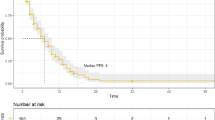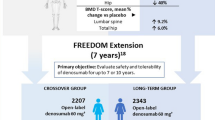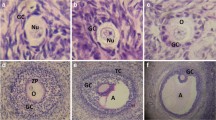Summary
Both medroxyprogesterone acetate (MPA) and megestrol acetate (MA) are effective in the treatment of metastatic breast cancer. Although the dose-dependent mode of actions of MPA have been extensively clarified, there is still some uncertainty regarding the mode of actions and dosage of MA. Thirty-three patients with metastatic breast cancer were treated with various dosages of MA under a phase-II study. Eight patients were given 200 mg, 9×400 mg, 10×600 mg and 6×800 mg MA daily per os. The LH, FSH, TBI, T3, T4, TSH, ACTH, aldosterone, testosterone, prolactin and cortisol levels were determined regularly during treatment to enable the investigation of the pharmacodynamics of MA. A complete remission was achieved in two patients, a partial remission in seven patients and there was no change in eight patients (total responder rate 51.5%). The clinical and endocrine changes therefore suggest that the dose-dependent mode of actions of MPA and MA are identical. Equivalent dosages of MPA are 1000–1500 mg per os and of MA 160–200 mg. Furthermore, similar relationships between the endocrine changes and remission behaviour of MA and MPA have been observed. Persisting tumour remissions are inevitable under cortisol suppression and normal prolactin, aldosterone and ACTH levels.
Similar content being viewed by others
Abbreviations
- CR:
-
komplette Remission
- MA:
-
Megestrolazetat
- MPA:
-
Medroxyprogesteronazetat
- NC:
-
keine Veränderung
- PD:
-
progrediente Erkrankung
- PR:
-
partielle Remission
Literatur
Alexieva-Figusch J, Blankenstein MA, Hop VCJ, Klijn JGM, Lamberts SWJ, DeJong FH, Docter R, Adlercreutz H, Van Gilse HA (1984) Treatment of Metastatic Breast Cancer Patients with Different Dosages of Megestrol Acetate, Dose Relations, Metabolic and Endocrine Effects. Eur J Cancer Clin Oncol 20:33–40
Ansfield FJ, Kallas GJ, Singson JP (1982) Clinical results with megestrol acetate in patients with advanced carcinoma of the breast. Surg Gynecol Oncol 155:888–890
Barbierei RL, Osathanoudh R, Ryan KJ (1981) Danazol inhibition of steroidgenesis in the human corpus luteum. Obstet Gynecol 57:722–724
Blossey H-C, Wander H-E, Köbberling J, Nagel GA (1984) Pharmacokinetic and pharmacodynamic basis for the treatment of metastatic breast cancer with high dose medroxyprogesterone acetate. Cancer 54:1208–1215
Canetta R, Florentine S, Hunter H, Lenaz L (1983) Megestrol acetate. Cancer Treatm Rev 10:141–157
Ganzina P, Robustelli della Cuna G (1982) Nebenwirkungen unter der Therapie hormonabhängiger Tumoren mit hochdosiertem Medroxyprogesteronazetat (HD-MPA) Med Klin (Sondernummer) 2:11–14
Geller J, Albert J, Geller S, Lopez D, Cantor T, Yen S (1976) Effect of megestrol acetate (Megacer) on steroid metabolism and steroid-protein binding in the human prostate. J Clin Endocrinol Metab 43:1000–1008
Hayward JC, Carbone PO, Heuson JC, Kumaoka S, Segaloff A, Reubens RD (1977) Assessment of response to therapy in advanced breast cancer Cancer 39:1289–1294
Hellman L, Yoshida K, Zumoff B, Levin J, Kream J, Fukushima DK (1976) The effect of medroxyprogesterone acetate on the pituitary-adrenal axis. J Clin Endocrinol Metab 42:912–917
Iacobelli S, Longo P, Scambia G, Natori V, Sacco P (1980) Progesterone receptors and hormone sensitivity of human endometrial carcinoma. In: Iacobelli S, Dimarco A (eds) Role of medroxyprogesterone acetate in endocrine-related tumors. Progress in cancer research and therapy. vol. 15, Raven Press, New York, pp 91–106
Izuo M, Iino Y, Tominaga T, Nomura Y, Abe O, Enomoto K, Takatani O, Kubo K (1982) Hochdosierte orale Therapie mit Medroxyprogesteroneazetat beim fortgeschrittenen Brustkrebs: klinische und endokrinologische Untersuchungen. Med Klin (Sondernummer) 2:23–28
Johnson PA, Bonomi PhD, Anderson KM, Wolter JM, Bacon LD, Rossof AH, Economou StG (1983) Progesterone receptor level as a predictor of response to megestrol acetate in advanced breast cancer: a retrospective study. Cancer Treatm Rep 67:717–720
Köbberling J, vz Mülhen A (1972) Methodische Untersuchungen zur Bestimmung der Plasmacorticoide mit der Proteinbindungsmethode. Z Klin Chem Klin Biochem. 2:67–73
McGuire WL, Carbone PP, Has ME (1975) Estrogen receptors in breast cancer. In: McGuire WL, Carbone PP, Vollmer PD (eds) Estrogen receptors in human breast cancer. Raven Press, New York
Morgan LR, Donley PJ, Savage J (1983) High dose megestrol acetate (MA) in advanced breast cancer: bioavailability, toxicity and response. Proc Am Ass Cancer Res 24:134, Abstr. 529
Nagel GA, Wander H-E, Blossey H-C (1981) Hyperprolactinämie beim metatasierenden Mammakarzinom. Schweiz Med Wschr 111:1977–1979
Nagel GA, Holtkamp W, Wander HE, Blossey H-C (1982) Hyperprolactinemia and bromocriptine in metastatic breast cancer. Proc Am Ass Cancer Res 23:Abstr 548
Nagel GA, Blossey H-C, Wander H-E (1983) Low versus high doses hormones in the treatment of malignant tumors. 13th Intern. Congress of Chemotherapy, Proc. SY 75, 209/49–63, Vienna
Pannuti F (1979) Die hochdosierte Gestagenbehandlung in der Therapie des fortgeschrittenen Mammakarzinoms. Onkologie 2:54–60
Robustelli della Cuna G, Preti P, Pavesi L (1983) Overview of clinical results with high doese medroxyprogesterone acetate (HD-MPA) in advanced breast cancer 13th Intern. Congress of Chemotherapy, Proc SY 97, 219/9–19, Vienna
Stoll BA (1967) Progestin therapy of breast cancer: comparison of agents. Br Med J 3:338–341
Teulings FAG, van Gilse HA, Henkelman MS, Portengen H, Alexieva-Figusch J (1980) Estrogen, Androgen, Glucocorticoid and Progesterone Receptors in Progestin-induced Regression of Human Breast Cancer. Cancer Res 40:2557–2561
van Veelen H, Willemse PHB, Sleijfer DT, Pratt JJ, Sluiter WJ, Doorenbos H (1984) Adrenal suppression by oral high-dose medroxyprogesterone acetate in breast cancer patients. Cancer Chemother Pharmacol 12:83–86
Wander H-E, Blossey Ch, Köbberling J, Nagel GA (1983) Hochdosiertes Medroxyprogesteronacetat beim metastasierenden Mammakarzinom: Beziehungen zwischen Krankheitsverlauf und Hormonprofilen. Klin Wochenschr 61:553–560
Author information
Authors and Affiliations
Rights and permissions
About this article
Cite this article
Wander, H.E., Blossey, H.C., Nagel, G.A. et al. Megestrolazetat in verschiedenen Dosierungen bei der Behandlung des metastasierenden Mammakarzinoms — Klinische und endokrinologische Untersuchungen. Klin Wochenschr 63, 312–318 (1985). https://doi.org/10.1007/BF01731974
Received:
Revised:
Accepted:
Issue Date:
DOI: https://doi.org/10.1007/BF01731974




